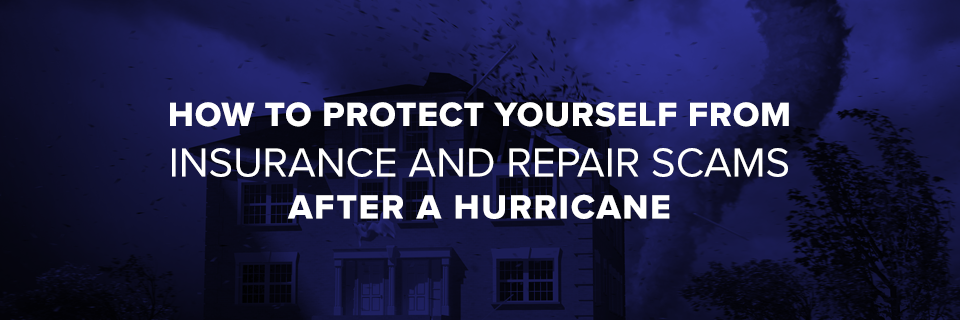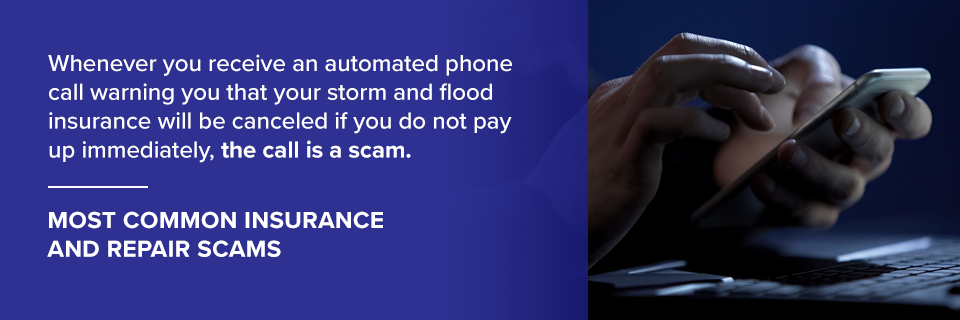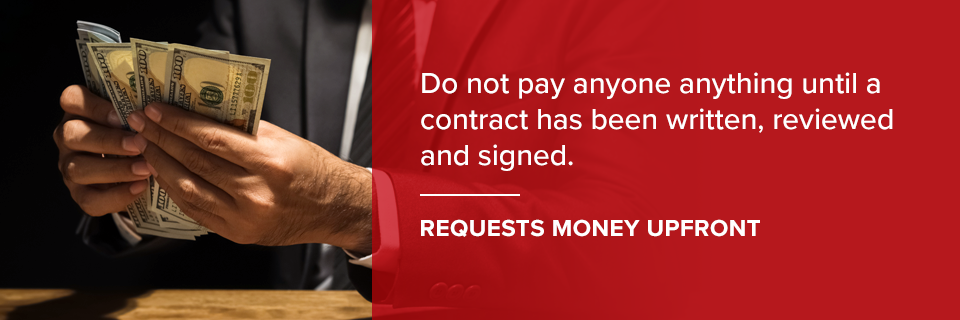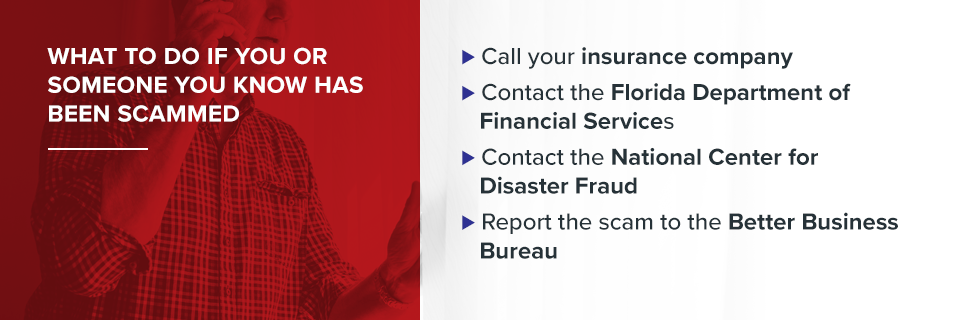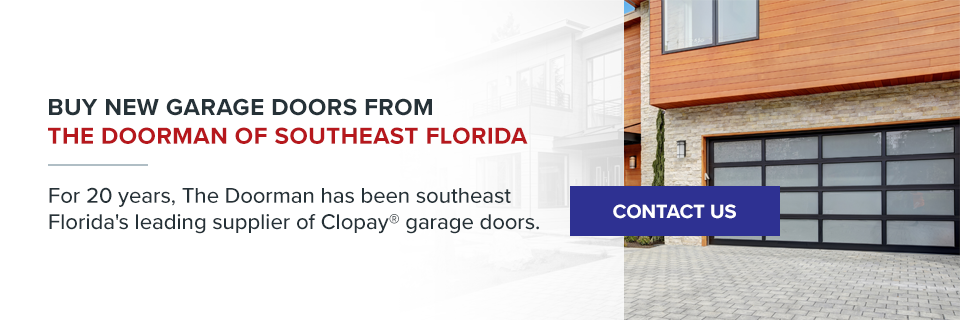In the wake of a hurricane, the insurance companies that cover the affected area will generally be swamped with claims from ravaged homeowners. As these companies rush to process all these claims, many families are displaced for days and sometimes weeks.
With so much confusion and desperation at hand, repair scam artists often descend upon disaster areas to con needy, unsuspecting homeowners into costly, unfair contracts. Even worse, many of these scammers split with the cash and never finish the stipulated repairs. As the influx of such activity increases, it is crucial to know the red flags so that you can identify scam contractors.
In this guide, we will cover:
- Most Common Insurance and Repair Scams
- How to Know If Someone is Trying to Scam You
- How to Avoid Being Scammed After a Hurricane
- What to Do If You or Someone You Know Has Been Scammed
Most Common Insurance and Repair Scams
Home repair scammers operate with the sole intention of bilking large sums from desperate, unsuspecting owners of storm-ravaged properties. In the days that follow a catastrophic storm, affected homeowners are desperate to get their lives in order as soon as possible. Consequently, the urge to sign fetching contracts can be heavily tempting. Insurance and repair scams are typically encountered in the following forms:
- Door-to-door solicitation: Repair scammers will often knock on doors up and down the neighborhoods of ravaged areas in the days that follow a hurricane. The scammer will typically make bold claims about what they can do for your property, offer up an unrealistic quote and ask you to make an upfront payment, all without sharing any legal identification or local contact info. In many cases, these scammers will come from out of town and lack licenses to do contract work in your area.
- Robocalls: Whenever you receive an automated phone call warning you that your storm and flood insurance will be canceled if you do not pay up immediately, the call is a scam. To review the status of your insurance payments, call your insurance provider.
- Social media charity scams: Scammers often set up pages on social media networks that contain bogus charity links to fraudulent donation websites. Links of this nature are also sent in bulk emails. A good rule of thumb is to never click a “charity” link on the web or in your email browser. To make charitable donations, type the URL of a known and trusted donation site into your search bar.
How to Know If Someone Is Trying to Scam You
To prevent home repair scams, learn to spot the common red flags of a bogus contractor. In the aftermath of a disaster, a door-to-door scam artist or storm chaser will generally make bold promises and ask for agreements and money upfront yet refuse to share his or her credentials or furnish any legal documents.
- Requests for personal info: Repair scam artists will typically request personal info without showing their own licenses or insurance documents. If someone comes to you in the wake of a disaster asking you to reveal your personal information, end the talk and close the door immediately.
- Doesn’t put quotes in writing: Bogus contractors will often give quotes on the fly after a brief look at the damages sustained on a given property. Unless a contractor offers to put the quote in writing, do not even consider this person’s services.
- Requests money upfront: Scam artists are generally out to make quick cash from people in need and will, therefore, make bold promises with the caveat that you pay the amount up front. Do not pay anyone anything until a contract has been written, reviewed and signed — and ideally make sure the work is completed correctly before a payment is made in full.
- Only accepts cash: In the rush to make a buck, scam contractors will typically ask you to pay them in cash. Do not hand over any cash either before or after a contract has been signed. Should you sign with a contractor, make your deposit and final payment by check or credit card.
- Requires an immediate decision: Knowing the urgency of post-disaster scenarios, a scam artist is liable to exploit your needs by asking you to make a decision on the spot during your first interaction. Do not make any decision until you know and understand your options.
- Requires financing from a lender of their choice: For any kind of repair work done on your home or garage door, it is crucial to work only with entities you trust. To that end, only work with a contractor who will agree to financing from a lender of your choice.
- Doesn’t show licenses or insurance documents: Any legit contractor will happily furnish copies of his or her license to do business in your state or county as well as all insurance documents about liability and workers comp. If a “contractor” comes to your door and refuses this request, end the interaction immediately.
- Doesn’t have a local phone number: A legit contractor will have a local office and phone number. If you speak with a “contractor” who uses an out-of-state or 1-800 number, the person in question is likely a storm chaser.
How to Avoid Being Scammed After a Hurricane
To avoid garage door repair scams and weed out potential storm chasers, speak with other homeowners about their experiences with local contractors. Here are some more steps you can take to avoid being scammed:
- Talk to your own insurance agent or claims adjuster: In the aftermath of a hurricane or other natural disaster, speak with your own insurance agent about the extent of your damage. By speaking with someone you know to be a verified expert, you’ll be able to sniff out the false claims of storm chasers.
- Speak with family, friends and neighbors: Get an idea from your relatives and associates about the best options regarding storm repairs. If a storm has hit your block, ask your neighbors what options they might consider or have already chosen.
- Ask to see the I.D. of anyone who comes to your door: If someone knocks on your door and claims to be a contractor, only proceed with the conversation if the person will show you his or her identification and legal information.
- Compare the estimates of at least three contractors: Before you choose to have your home or garage door repaired by a specific contractor, check your options to ensure that you get the best deal available in your area.
- Ask for copies of a contractor’s liability and worker’s compensation insurance: Request documents that confirm the contractor’s insurance coverage. Only proceed if the insurance will spare you of any liability in the event of work-related injuries on your property.
- Ask for copies of a contractor’s state or local business license: Procure copies of documents that confirm the contractor’s license to do business in your area. Storm chasers typically come from out of town without local licenses and therefore disappear before work repairs are scheduled to commence.
- Check online to see whether the contractor is licensed and insured: After the contractor has shown his or her licensing and insurance documents, double check these legal filings online to verify this individual’s authenticity.
- Check with the licensing authority or BBB for any past complaints against the contractor: Learn whether the contractor you speak with is generally held in high esteem by their past clients. Check online to determine whether past reviews are mostly positive, mixed or negative and whether these reviews seem legit or phony.
- Be present for any property inspection: Never allow a contractor to inspect your property in your absence. Crooked contractors will sometimes bring hammers to exacerbate structural damage in order to inflate claims. For example, garage door repair scams often involve post-disaster spring tampering. Preferably, you should also have a family member present as you monitor the inspection.
- Document all the destruction yourself: Take notes of all the damage that your contractor points out during the inspection of your property. This way, the contractor will not be able to report a more exaggerated version of the damage to your insurance company.
- Ask the contractor for local references: Ask the contractor about other homeowners or building owners who have used their services. If possible, contact some of these prior clients to see how they feel about the contractor’s work.
- Ask an advisor to accompany you for the contract signing: Never sign any contract in the absence of an advisor who you know and trust. When you bring a third-party expert to read the contract with you, the fairness of the terms can be more readily verified.
- Get the contract in writing, including oral promises: When it comes to a contract, any agreement not in writing does not legally exist. Make sure that all the details of your oral agreement are explicitly outlined in the written document.
- Read a contract fully before signing: Do not sign any document that you have not fully read and understood beforehand. Repair scam artists are keen to take advantage of the average homeowner’s eagerness to gloss over the fine print and formal, legal jargon on a given contract.
- Verify the planned repairs are covered by your insurance: Once the damages have been assessed and a dollar amount has been determined, contact your insurance company to ensure the repairs will be covered under your policy.
- Know your contract rights: In some areas, you can cancel a contract within three business days if you signed it based on a home visit from the contractor. When the contract is storm-related, you can often have that period extended.
- Do not agree to upfront payments: When it comes to repairs and negotiations with contractors, never pay for anything upfront. Your first payment should be the deposit, which is only made after a contract has been signed.
- Get a copy of the contractor’s signed contract: To verify you and the contractor are bound to the same agreement, request a copy of the fully signed contract.
- Do not pay for incomplete work: A repair scam artist will typically abandon a project if full payment for the work is procured beforehand. Beyond the initial deposit, do not make any payment until the work has been completed.
- Ask the contractor for a lien waiver before work commences: To ensure that you are never charged for the cost of labor and materials should the contractor not pay up, never sign a consent of owner statement. Instead, get a lien waiver receipt, which stipulates that you will not be charged for materials and labor once you have paid the contractor.
- Only pay the deposit by check or credit card: Never pay a contractor in cash. When you pay by check or credit card, your payments leave a paper trail that could be necessary down the line for the taxes. If discrepancies arise, the paper trail will also arm you with legal proof.
- Never sign your insurance over to the contractor: A bogus contractor will typically inflate claims to your insurance company. If you let this happen, you effectively lose control of your insurance policy. Confirm the authenticity of the contractor and the fairness of a given quote before you proceed with anything.
What to Do If You or Someone You Know Has Been Scammed
If you have been scammed by a fraudulent contractor, there are several routes of action you can take to redress the matter. By taking action, you can help stem the tide of scam operations and regain some peace of mind in the process.
- Call your insurance company: The first action to take is a call to your home insurance provider. Give the agent you speak with a detailed account of the actual damage to your home and how the quote you initially received differs from competing quotes on similar damages.
- Contact the Florida Department of Financial Services: Anytime you suspect fraudulent activity in the state of Florida, report the matter to the department’s Division of Consumer Services Insurance Consumer Helpline at 877-693-5236. Regardless of whether you or a loved one has been taken by the scam, any visit you receive from a fraudulent contractor should be reported to the DFS. Fraud task forces have also been established by U.S. attorneys in Florida to combat repair scams.
- Contact the National Center for Disaster Fraud: In response to the growing spate of repair scams in the wake of Hurricane Katrina, the NCDF was established by the U.S. Department of Justice to combat such activity. The NCDF hotline is listed on the center’s website.
- Report the scam to the Better Business Bureau: The BBB has a tracking page of known repair scams across North America. If you suspect similar activity in your area, report the matter on the scam-tracking page of the bureau’s website.
Buy New Garage Doors from The Doorman of Southeast Florida
Homes throughout Palm Beach County and Broward County require superior construction to withstand the brunt of massive windstorms. Even then, garage doors and homes structures are often ravaged when Atlantic hurricanes sweep inland. For 20 years, The Doorman has been southeast Florida’s leading supplier of Clopay® garage doors.
At The Doorman, we offer garage doors, entry doors and patio doors and accessories. Contact us today to learn more about the products and services we offer, including our $39.95 garage door tune-up. You can also visit our showroom. We’re located at 940 Clint Moore Road in Boca Raton, Fla., and we’re open Monday through Sunday from 7:30 a.m. to 5 p.m.
Request Garage Door Repair or Service
Related Posts
Tips for Avoiding Garage Door Scams in Florida
How to Open Your Garage Door If You Lose Power
5 Tips for Making Your Home More Secure
When Should You Replace Your Garage Door?

